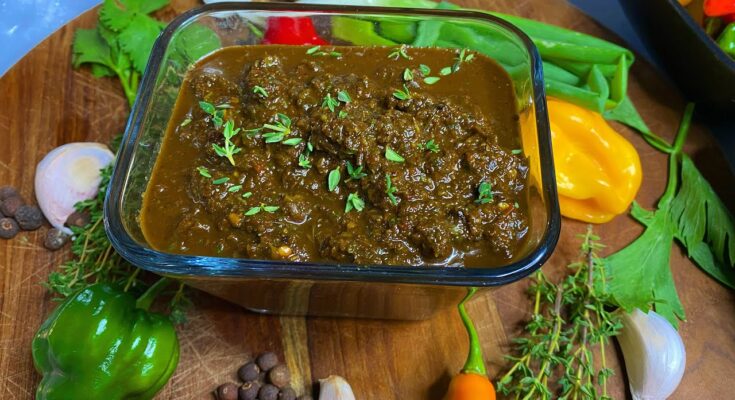Jerk Marinade Recipe: If you’ve ever had authentic Jamaican cuisine, chances are you’ve tasted the bold and fiery flavors of jerk seasoning. Jerk marinade is the heart and soul of jerk-style cooking—a blend of spices, herbs, and heat that brings food alive with smoky, spicy, and slightly sweet undertones. This isn’t just another seasoning mix; it’s a flavor experience deeply tied to Caribbean culture.
Originating in Jamaica, jerk cooking dates back to the Maroons—enslaved Africans who escaped into the mountains and developed unique cooking methods using local herbs and spices. They would preserve meat by seasoning it heavily and slow-cooking it over pimento wood. The marinade was not just about flavor; it was about survival and tradition. Over time, jerk seasoning became synonymous with Jamaican identity, celebrated across the world for its complexity.
When you taste jerk marinade, you’re experiencing more than just a spice blend. You’re connecting with centuries of history, resilience, and creativity. Today, it’s enjoyed globally, from street food vendors in Kingston to backyard BBQs in the United States. Whether you want to grill chicken, roast vegetables, or spice up seafood, jerk marinade can transform any dish into something unforgettable.
Why Make Your Own Jerk Marinade at Home?
You might wonder—why not just buy a bottle of jerk marinade from the store? While convenient, store-bought marinades often lack the depth of flavor that comes from fresh ingredients. Many brands load their sauces with preservatives, artificial flavor enhancers, and too much salt. On the other hand, making your own jerk marinade at home allows you to control every single element.
For one, you can customize the heat level. Authentic jerk packs a punch, often using Scotch bonnet peppers, which are among the hottest chilies in the world. But if you prefer a milder marinade, you can adjust the number of peppers or substitute with a less fiery variety. The same goes for sweetness and acidity—you can balance the flavors exactly the way you like.
Another benefit of homemade jerk marinade is freshness. Fresh thyme, garlic, scallions, and lime juice add vibrant layers that bottled versions just can’t replicate. Plus, preparing it yourself means you can avoid unnecessary additives while keeping the flavors bold and clean.
And let’s be honest—there’s something satisfying about crafting your own seasoning from scratch. When you serve up jerk chicken, shrimp, or even tofu that’s been marinated in your homemade blend, the flavor will speak for itself. It’s fresher, richer, and made with love.
Ingredients You’ll Need for Authentic Jerk Marinade
The secret to a great jerk marinade lies in the balance between heat, sweetness, spice, and freshness. Here’s a list of the key ingredients you’ll need:
Essential Ingredients
- Scotch bonnet peppers (or habaneros) – The source of authentic heat.
- Fresh thyme – Adds earthy, aromatic notes.
- Garlic cloves – For that deep savory punch.
- Scallions (green onions) – Fresh, slightly sweet onion flavor.
- Ginger – A warm, spicy undertone.
- Allspice (pimento) – The signature spice in jerk seasoning.
- Brown sugar – Balances the heat with sweetness.
- Soy sauce – For umami depth.
- Lime juice – Fresh acidity to brighten flavors.
- Ground cinnamon and nutmeg – Adds warm, sweet-spice complexity.
- Salt and black pepper – Basic but essential seasonings.
Optional Ingredients
- Orange juice – Adds sweetness and tang.
- Vinegar – For extra acidity and preservation.
- Olive oil – Helps coat meats and veggies evenly.
- Cloves – For deeper spice complexity.
- Honey – If you like a sweeter marinade.
When you put these ingredients together, you get a marinade that’s fiery, aromatic, and perfectly balanced. The beauty is that you can adjust the recipe based on your taste buds—whether you want extra heat, more sweetness, or additional tang.
Step-by-Step Guide to Making Jerk Marinade
Ready to make it? Let’s walk through the process step by step.
Step 1: Gather and Prep Ingredients
Before you start, lay out all your ingredients. Wash your scallions, peel your garlic, and chop your peppers. Be careful with Scotch bonnets—they are extremely hot, so wear gloves while handling them and avoid touching your face.
Step 2: Blend the Marinade
Place all the ingredients into a blender or food processor. Pulse until smooth, scraping down the sides to make sure everything blends evenly. The mixture should be thick but pourable.
Step 3: Adjust the Flavor Balance
Taste your marinade. Is it too hot? Add more lime juice or brown sugar. Too sweet? Add an extra pepper or some vinegar. Adjust until you find the perfect balance.
Step 4: Marinating Your Protein
Pour the marinade over your chicken, pork, fish, or vegetables in a resealable bag or bowl. Make sure everything is well coated. Cover and refrigerate for at least 4 hours—overnight is even better.
The result? A deeply flavored, fiery, and aromatic marinade that will take your dish to the next level.
Tips for the Perfect Jerk Marinade
Making jerk marinade isn’t complicated, but a few tips can help you get restaurant-quality results every time.
- Marinate Long Enough – For chicken and pork, aim for at least 8 hours. Seafood and vegetables need less time—about 1–2 hours.
- Don’t Skip Allspice – This is the backbone of jerk flavor. Without it, your marinade won’t taste authentic.
- Balance Heat and Sweetness – Scotch bonnets are hot, but brown sugar and citrus keep it balanced.
- Cook It Right – Traditionally, jerk is cooked over pimento wood, but you can grill, roast, or pan-sear for great results.
- Store Safely – Keep unused marinade in the fridge for up to a week, or freeze it in portions for up to 3 months.
Master these tips, and your jerk marinade will impress every single time.
Variations of Jerk Marinade
One of the best things about jerk marinade is its versatility. While there’s a traditional way to prepare it, you can always put your own spin on it. Depending on your taste preferences and dietary needs, you can adjust ingredients to create different versions that still carry the essence of Jamaican jerk.
Spicy vs. Mild Versions
Authentic jerk marinade packs serious heat because of Scotch bonnet peppers. But not everyone can handle that level of spiciness. For a milder version, you can substitute Scotch bonnets with jalapeños or even red chili flakes. Another trick is to use only one Scotch bonnet and balance it out with more citrus juice and a touch of honey. This way, you still get the kick without overwhelming your taste buds.
For spice lovers, you can turn up the heat even more. Add extra peppers, a pinch of cayenne, or even hot sauce to intensify the fire. Keep in mind, though, that Scotch bonnets have a unique fruity flavor that sets them apart from other chilies, so try not to replace them entirely if you want authenticity.
Vegan and Vegetarian-Friendly Options
Jerk isn’t just for chicken or pork—it can be just as amazing with plant-based dishes. Vegetables like eggplant, zucchini, and bell peppers soak up the marinade beautifully. Tofu and tempeh also work wonders, especially when pressed to remove excess water before marinating.
If you’re vegan, you might want to skip soy sauce if it contains animal-derived additives. Instead, use tamari or coconut aminos for a gluten-free and vegan-friendly alternative. A splash of olive oil in the marinade also helps coat veggies more evenly, ensuring every bite bursts with jerk flavor.
Fusion-Style Jerk Marinades
Want to get creative? Try blending jerk flavors with other cuisines for a fusion twist. A jerk-teriyaki mix can bring a sweet-and-spicy balance perfect for stir-fry. Jerk-barbeque marinade works beautifully for ribs or wings, combining smoky Southern flavors with Caribbean spice.
Another fun idea is a jerk-curry marinade. Adding curry powder to the mix enhances the depth of flavor and makes a great base for stews or slow-cooked dishes. This kind of experimentation allows you to enjoy jerk flavors in fresh and exciting ways while still paying homage to its Jamaican roots.
What to Serve with Jerk-Marinated Dishes
The magic of jerk marinade isn’t just in the main dish—it’s also about what you pair it with. Traditional Jamaican sides elevate the flavor, while modern accompaniments can create a more global dining experience.
Traditional Jamaican Sides
- Rice and Peas – The classic pairing. Coconut-infused rice cooked with kidney beans and spices balances the heat of jerk perfectly.
- Fried Plantains – Sweet and caramelized, these soften the fiery spice of jerk dishes.
- Festival (Jamaican fried dumplings) – Slightly sweet, golden-brown, and fluffy on the inside.
- Bammy (cassava flatbread) – A starchy, chewy side that soaks up the marinade beautifully.
Modern Pairings
If you want to go beyond traditional Jamaican sides, jerk pairs well with many global flavors. A fresh mango salsa adds sweetness and freshness, while a cooling cucumber yogurt dip can tone down the spice for beginners. You can also serve jerk-marinated meats in tacos, wraps, or sliders for a fun twist on presentation.
For drinks, consider something refreshing and tropical. A cold Red Stripe beer (Jamaican lager) is a classic, but fruit-based cocktails like pineapple mojitos or rum punch also complement jerk flavors perfectly.
Common Mistakes to Avoid
Even the best marinades can go wrong if a few key details are overlooked. Here are some common mistakes you’ll want to avoid when making and using jerk marinade:
Overpowering Spice Levels
It’s tempting to load your marinade with Scotch bonnets for maximum heat, but too much can overwhelm the other flavors. Jerk isn’t just about spice—it’s about balance. If you can’t taste the allspice, thyme, and citrus behind the heat, you’ve gone too far.
Not Marinating Long Enough
Jerk marinade needs time to work its magic. Rushing the process and only marinating for an hour won’t give your dish the depth it deserves. Ideally, marinate meats overnight to let the flavors soak all the way through. Seafood and veggies don’t need as long but still require at least an hour.
Using the Wrong Cooking Method
Jerk is traditionally cooked over pimento wood, which imparts a smoky, aromatic flavor. While you may not have access to that, grilling or roasting are the next best options. Avoid boiling or pan-frying without searing, as it won’t give you the same depth of flavor.
Reusing Marinade Unsafely
Never reuse marinade that has come into contact with raw meat without cooking it first. If you want to use it as a sauce, boil it for a few minutes to kill bacteria. Alternatively, set aside some fresh marinade before adding it to your proteins.
By avoiding these mistakes, you’ll ensure your jerk marinade shines every single time.
How to Store Jerk Marinade
One of the great things about jerk marinade is that you can make it ahead of time and keep it on hand for quick meals. But proper storage is key to keeping it fresh and safe.
Refrigeration Tips
Store your marinade in an airtight glass jar or container. Kept in the fridge, it will stay fresh for up to 7–10 days. Since it contains fresh herbs and citrus, it may lose potency after that time. Always check for signs of spoilage before using.
Freezing for Longer Shelf Life
If you want to keep jerk marinade for longer, freezing is the way to go. Pour the marinade into ice cube trays, freeze, and then transfer the cubes into a freezer bag. This makes it easy to defrost just the amount you need for a quick weeknight meal. Properly stored, jerk marinade can last up to 3 months in the freezer without losing flavor.
Tips for Maximum Freshness
- Always use clean spoons or measuring cups to scoop marinade—never dip raw meat directly into the jar.
- Consider vacuum-sealing if you make large batches.
- Label jars or bags with the date so you know when it’s time to use them.
Stored correctly, jerk marinade is your secret weapon for quick, flavorful meals anytime you need a taste of the Caribbean.
Health Benefits of Jerk Marinade Ingredients
Aside from its bold and irresistible flavor, jerk marinade also packs a surprising nutritional punch. Many of its ingredients are loaded with vitamins, minerals, and antioxidants that contribute to overall health. When you make your marinade at home, you get the benefit of fresh, wholesome ingredients without unnecessary additives.
Nutritional Value of Spices
- Allspice (Pimento): Known for its warm, peppery-sweet flavor, allspice is rich in antioxidants that may help reduce inflammation and support digestion.
- Nutmeg and Cinnamon: These spices not only add depth to the flavor but also contain compounds that help regulate blood sugar and support heart health.
- Black Pepper: Improves digestion and boosts nutrient absorption in the body.
Immune-Boosting Herbs and Aromatics
- Garlic: A natural immune booster, garlic has antibacterial and antiviral properties. It’s also great for heart health and reducing blood pressure.
- Thyme: Loaded with vitamin C and antioxidants, thyme helps strengthen the immune system.
- Ginger: Known for its anti-inflammatory benefits, ginger supports digestion and relieves nausea.
Fruits and Citrus
- Scotch Bonnet Peppers: While fiery, these peppers are rich in vitamin C and capsaicin, which boost metabolism and promote heart health.
- Lime Juice: High in vitamin C, it helps detoxify the body and adds refreshing acidity to balance the spices.
When you put all of these together, jerk marinade becomes more than just a flavor enhancer—it becomes a nutritional powerhouse. Of course, moderation is key, especially if you’re sensitive to spicy foods, but overall, jerk marinade can be part of a healthy diet that supports your immune system, metabolism, and overall wellness.
Using Jerk Marinade Beyond Meats
Traditionally, jerk marinade is associated with chicken and pork. But its flavor is so versatile that you can use it in countless other dishes. If you’re looking to expand your culinary horizons, here are some creative ways to use jerk marinade:
Vegetables
Grilled or roasted vegetables like zucchini, mushrooms, cauliflower, and bell peppers soak up jerk flavors beautifully. Coat them lightly with marinade before grilling, and you’ll get a smoky, spicy, and slightly sweet taste that pairs perfectly with almost any main dish.
Seafood
Fish, shrimp, and lobster all shine when marinated in jerk seasoning. Since seafood is delicate, a shorter marinating time (30 minutes to 1 hour) is enough to infuse the flavors without overpowering the natural taste. Jerk shrimp skewers or jerk-marinated salmon are fantastic options for summer grilling.
Tofu and Plant-Based Options
For vegetarians and vegans, jerk marinade can transform tofu, tempeh, or seitan into flavorful main courses. Press tofu to remove excess moisture, marinate for a few hours, and then grill or pan-sear until golden brown. The marinade adds smoky depth that makes plant-based meals feel hearty and satisfying.
Creative Uses
- Dips and Sauces: Mix jerk marinade with Greek yogurt or sour cream to create a spicy dip for chips or veggies.
- Sandwiches and Wraps: Use jerk-marinated meat or tofu as the star of a wrap or sandwich, paired with fresh slaw and creamy sauces.
- Dressings: Blend a small amount into olive oil and lime juice for a fiery salad dressing.
- Soups and Stews: Add a spoonful of jerk marinade to soups or curries for a depth of spice and flavor.
By experimenting with jerk marinade, you’ll find it goes far beyond barbecue—it’s a kitchen staple that can elevate almost any dish.
FAQs about Jerk Marinade Recipe
1. How spicy is jerk marinade?
Traditional jerk marinade is very spicy due to Scotch bonnet peppers, which rank high on the Scoville scale. However, you can adjust the spice level by reducing the number of peppers or using milder chilies.
2. Can I use jerk marinade as a sauce?
Yes, but be careful. If the marinade has been in contact with raw meat, you’ll need to boil it for a few minutes to kill any bacteria. Alternatively, set aside some fresh marinade before using it on raw proteins.
3. What’s the best meat for jerk marinade?
Chicken and pork are the most popular choices, but beef, lamb, fish, and shrimp also work beautifully. Even vegetarian proteins like tofu can soak up the flavors.
4. How long should I marinate food in jerk seasoning?
For chicken and pork, marinate overnight (at least 8 hours). For seafood and vegetables, 1–2 hours is plenty. Tofu should be marinated for about 3–4 hours for maximum flavor.
5. Can I freeze jerk marinade?
Absolutely! Jerk marinade freezes well for up to 3 months. Store it in ice cube trays or freezer bags for easy portioning.
Conclusion
Jerk marinade isn’t just a recipe—it’s a cultural treasure with deep roots in Jamaican history. From its fiery Scotch bonnet peppers to its earthy allspice and fragrant thyme, every ingredient tells a story. By making your own marinade at home, you gain full control over flavor, spice levels, and freshness. Whether you’re grilling chicken, roasting vegetables, or experimenting with tofu, jerk marinade has the power to transform simple dishes into unforgettable meals.
The beauty of jerk lies in its balance—heat, sweetness, spice, and freshness all working together. And the best part? You can adjust it to your liking, making it as mild or fiery as you want. With proper storage, it’s also a convenient way to have bold, Caribbean flavors ready anytime.
So next time you’re looking to impress your family or guests, skip the store-bought sauce and whip up your own jerk marinade. Trust me—once you try it, you’ll never go back.



